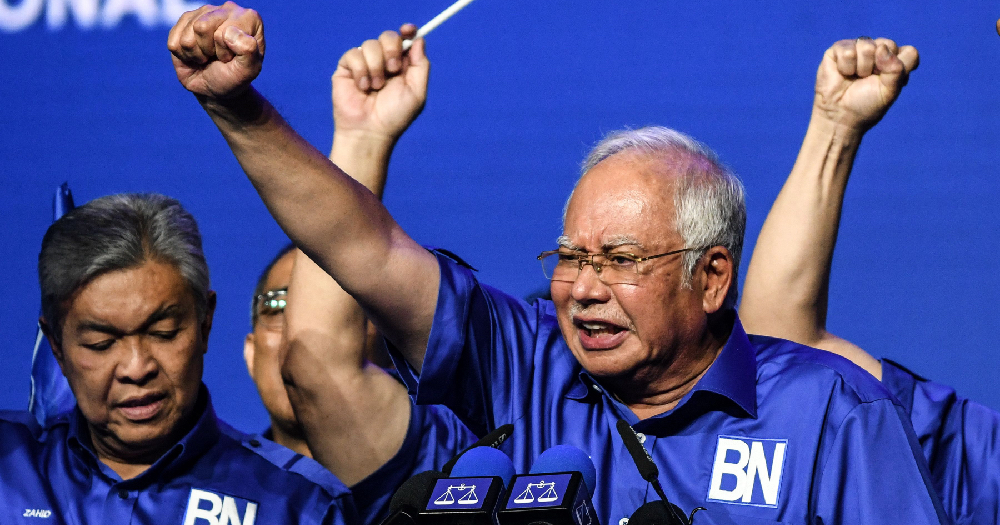Former Malaysian prime minister Najib Razak deliberately kept Malay Malaysians poor so they remained dependent on cash handouts that helped secure votes, claimed an expert Malaysian politics watcher.
This hypothesis was put forth by Ahmad Farouk Musa, the founder of the Islamic Renaissance Front, a think tank advocating reform and renewal in Islam.
Keeping the Malays poor on purpose?
Speaking at a seminar held at ISEAS-Yusof Ishak Institute seminar on Monday, Aug. 26, Farouk claimed that the previous Barisan Nasional (BN) administration under Najib had deliberately kept the Malays in the country poor for its own political gain.
Some 40 percent of approximately 12.8 million households have a household income of below RM3,000 (S$990), and bumiputeras make up the largest proportion, he said.
He further explained the rationale behind the alleged policy:
1. Non-tax paying citizens are less concerned with government policies
As poor Malays do not fall into the income bracket for taxpayers, they are less concerned with what the government is doing, Farouk opined.
He added that most of them are more inclined to talk about whether certain foods contain porcine morsels, as opposed to "this man swindling the country of millions of dollars", referring to the sovereign fund scandal involving Najib.
2. Using cash handouts to "bribe" the bumiputeras
In addition, Farouk said the BN was using cash handouts to "bribe" the poor Malays into voting for them.
He likened this dependency on the handouts to how an addict is hooked on morphine.
Under the BR1M (1Malaysia People’s Aid) scheme, Malaysians with less than RM3,000 household earnings get RM950 (S$313) in three separate instalments, Farouk said.
But the scheme was later discontinued by Mahathir, and replaced by a scaled-down version called the BSH financial aid plan.
This was because while Mahathir was against such handouts and wanted to get rid of it, it was almost impossible to do so as the Malays wanted to continue receiving them, he claimed.
Current government carrying burden of problems developed over past 60 years
Furthermore, Farouk said the persistence of higher poverty rates among the bumiputeras as compared to the Chinese and Indian populations has led to discontent and resentment towards the Pakatan Harapan (PH) government.
This is because they think the coalition has failed to fulfil its campaign promises.
So, not only does the current administration have to shoulder the burden of what happened within the last 60 years under the BN, they also have to resolve such long-standing issues within the next four years until the next election, Farouk asserted.
Economic disparity leading to racial tensions?
Farouk also claimed that economic disparity is the main reason contributing to racial tensions in Malaysia.
Illustrating the current situation, he said calls for greater Islamic purity have increased, despite the "change in political climate" after the 2018 general elections that saw a shock victory by the PH coalition led by Malaysia's Prime Minister Mahathir Mohamad.
And while the Federal Constitution had put in place the necessary foundations to build a "secular, pluralistic democracy with provisions to ensure not only equality but equity", Malaysia is not guided by such ideals, Farouk said.
This is because these ideals have become "perverted" for the political mileage of the previous BN administration in promoting their agenda, he claimed.
UMNO & PAS playing up racial tensions for political gain
In addition, Farouk pointed out that the PH coalition does not have a lot of Malay support.
While the ruling coalition had won most of the parliament's 222 seats and was able to form a government, less than 30 percent of Malays voted for them -- the rest mostly voted for UMNO (United Malays National Organisation) and PAS (Malaysian Islamic Party).
He claimed that the two parties are making use of Islam to get support from the Malays.
They do this by reinforcing the perception that Malays in the PH coalition are "mere stooges" of the DAP (Democratic Action Party), he said.
By reinforcing such a perception, Farouk claimed that UMNO and PAS would be able to get the Malays to support their political agenda by "putting this apprehension upon the Malay voters", suggesting a sort of racial bias against the ethnic Chinese.
He further asserted that this divisive bias could keep even "the most kleptocratic government in the world in power", as long as the Malays were in power.
Address economic disparity to resolve racial issue
And the solution to relieving racial tensions in the country?
Farouk posited that Malaysia has to address the root cause leading to economic disparity in the country.
Otherwise, "contestation along race and religious issues" will worsen, he said.
He added that by making the Malays feel less of an economic burden, it will help alleviate "a little bit of fear that the Chinese (Malaysians) are taking over the country".
Top image via MOHD RASFAN/AFP/Getty Images
If you like what you read, follow us on Facebook, Instagram, Twitter and Telegram to get the latest updates.
